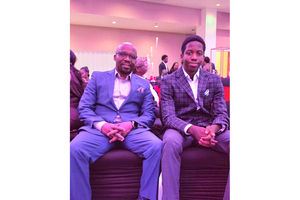A CHAT FROM LONDON: A thing or two about Kenyan actress Lupita Nyong’o
What you need to know:
- Anyway. We can talk about the film and slavery for months, for the moment let me share something little. Like a pause in a long conversation. Sigh.
One of the biggest talks across London and the uzunguni world this past week has been the film 12 Years a Slave by black British director Steve McQueen. Among its award winning cast is an actress from neighbouring Kenya who is brightening the northern hemisphere like a full, sparkling moon.
She has not only been praised for her brilliant acting abilities, but her character, looks and taste of clothing. The Western media is in love with her so much- that every other day something about her is being published. She is a breath of fresh air bubbling positive African news in the rich world. Just watch one of the numerous television interviews she did with Jimmy Kimmel Live! on ABC, on YouTube, for example to see what I mean.
When Hollywood star Leonard DiCaprio, stopped to kiss her on her cheek, photographers could not stop snapping. Yes. She is a star and an East African one at that. But, hold on. Who is she? What…is she called? To start with her name is a mouthful.
Lupita Nyong’o
Lupita is easy, but Nyong’o, for non-East Africans, is like teaching them to say ng’ombe (cow), ng’ang’ania (cling to) or ng’ambo (other side)…how do you pronounce that?
Yes, the actress’s name is as significant as her role, which has been described as “exceptional” by a close friend who saw the movie a few days ago. Performances of the Kenyan were so terrific that she has so far won Outstanding Performance for a Female Actor in a Supporting Role, and several other nominations including Golden Globe Award for Best Supporting Actress.
In 12 Years a Slave, Miss Nyong’o, plays Patsey, a female slave who is whipped, raped and abused by a White slave master and his wife. Yes. Slavery was (and continues to be) the black holocaust which claimed one billion souls. And these are considered rough estimates.
Anyway. We can talk about the film and slavery for months, for the moment let me share something little. Like a pause in a long conversation. Sigh.
What has really impressed me is Lupita’s naturalness and especially her hair style. It is refreshing to see a famous black woman with natural hair. Well trimmed, natural without wigs, perm and false treatment, always paraded and glamorised by black celebrity females…from President Obama’s wife, Michelle, to TV mogul Oprah Winfrey and musician Beyoncé. Part of the argument of our dear modern black women has been that African hair is hard and stiff and difficult to manage.
That conking, relaxing or waxing or treating it with chemicals and other things to make it smooth is better. Well, everyone has the right to do what they want to with their body and hair. Everyone. But what message has this been? According to Good Hair, a documentary by Afro American comedian Chris Rock in 2009, some of the products used to relax black hair like sodium hydroxide, burn and may damage women’s hair and scalps. No wonder many black women are losing their hair by the time they reach 40.
That is why it is invigorating seeing Lupita Nyong’o‘s natural beauty, composure and poise. She is like a bird, a star, a green girl from any village or town across Africa.
Lupita Nyong’o is, however, not your average village girl. She was born in Mexico City, where her father was a visiting lecturer at the university. Soon after they moved back to Kenya where Peter Anyang’ Nyong’o (notice the sounds of the Luo names) was professor at the University of Nairobi.
During her childhood, Lupita’s busy father was involved in the pro-democracy movement in Kenya and subsequently imprisoned and tortured for 26 days. He was also minister for Medical Services. Lupita has therefore, experienced a high-class life and the limelight. Apart from acting she produced, wrote and directed a documentary film about the ill-treatment of Albinos in Kenya (could have been Tanzania too) In My Genes in 2009. With such a CV we would expect the 30 year-old to be cocky and arrogant. A diva. Like some of our stars today!
On the contrary…
Impressed by her personality, journalist Amy Kaufman wrote in the Los Angeles Times of October 23, 2013:
“Even her outfit – a simple sweater and shorts- combination, looked like the kind of ensemble that would have her singled out by a street style photographer for a fashion designer magazine.”
She is an example of staying true to one’s roots and origins. Something rare these days, in our world of make-believe, false images, celebrity culture, fickleness and superficiality.
And this is not only applicable to Africans, but all races, gender and cultures. The earth (and universe) has a natural circle, power, energy and motor. No wonder the rich world’s media is exceptionally, impressed by the Kenyan. Her next film, Non Stop starring the Hollywood star, Liam Neeson (about an airplane hijack) is already finished. She is flying. Bless her.




